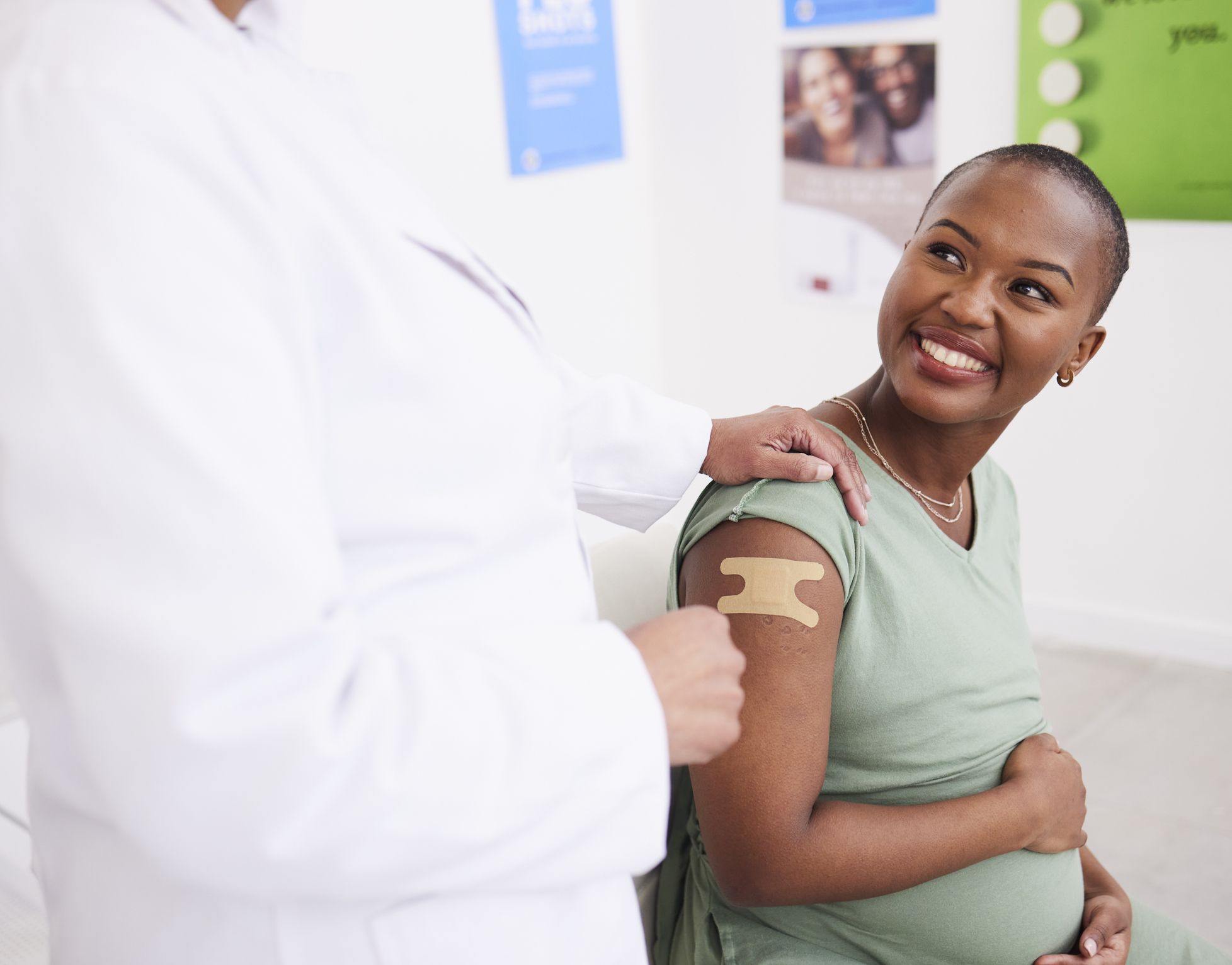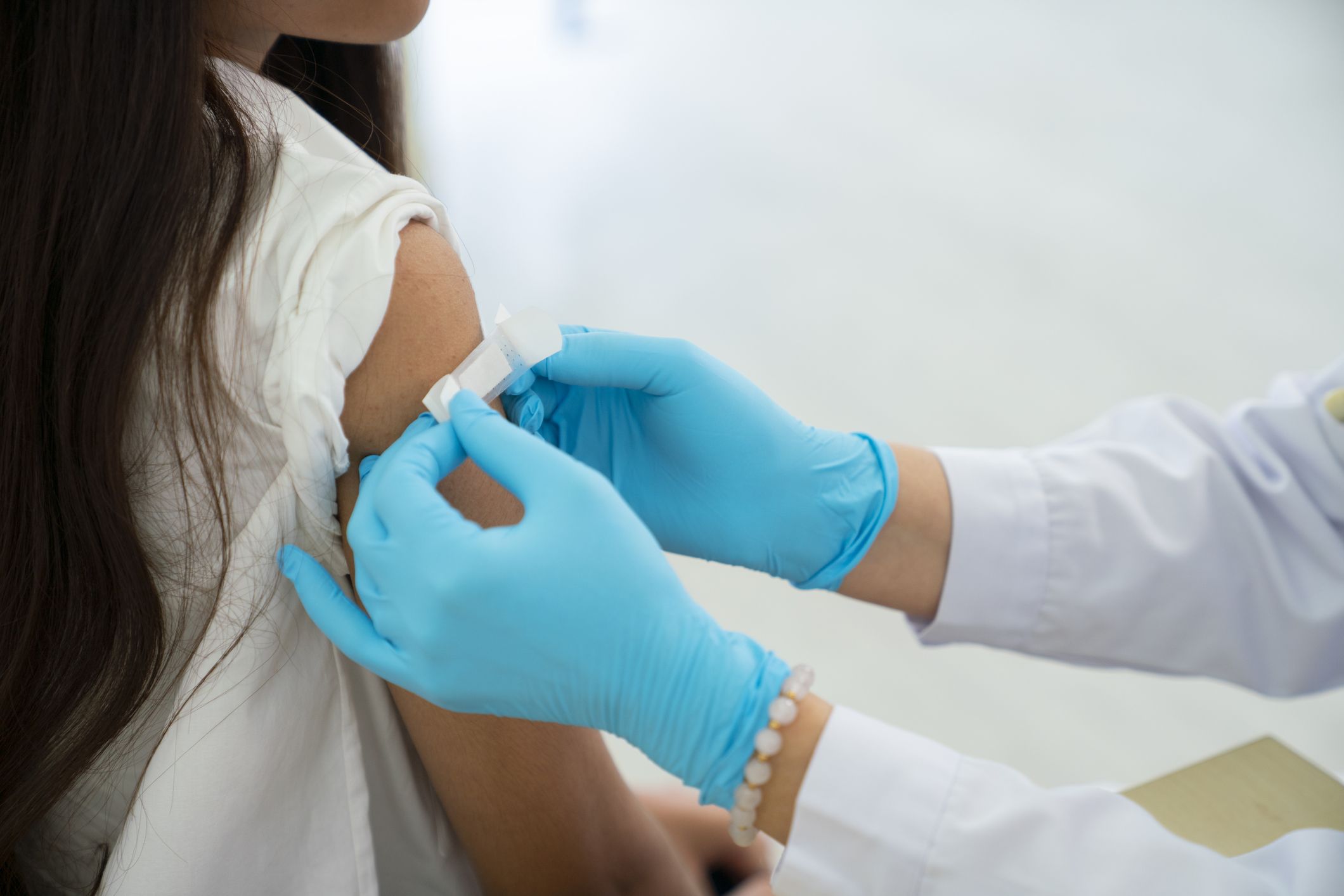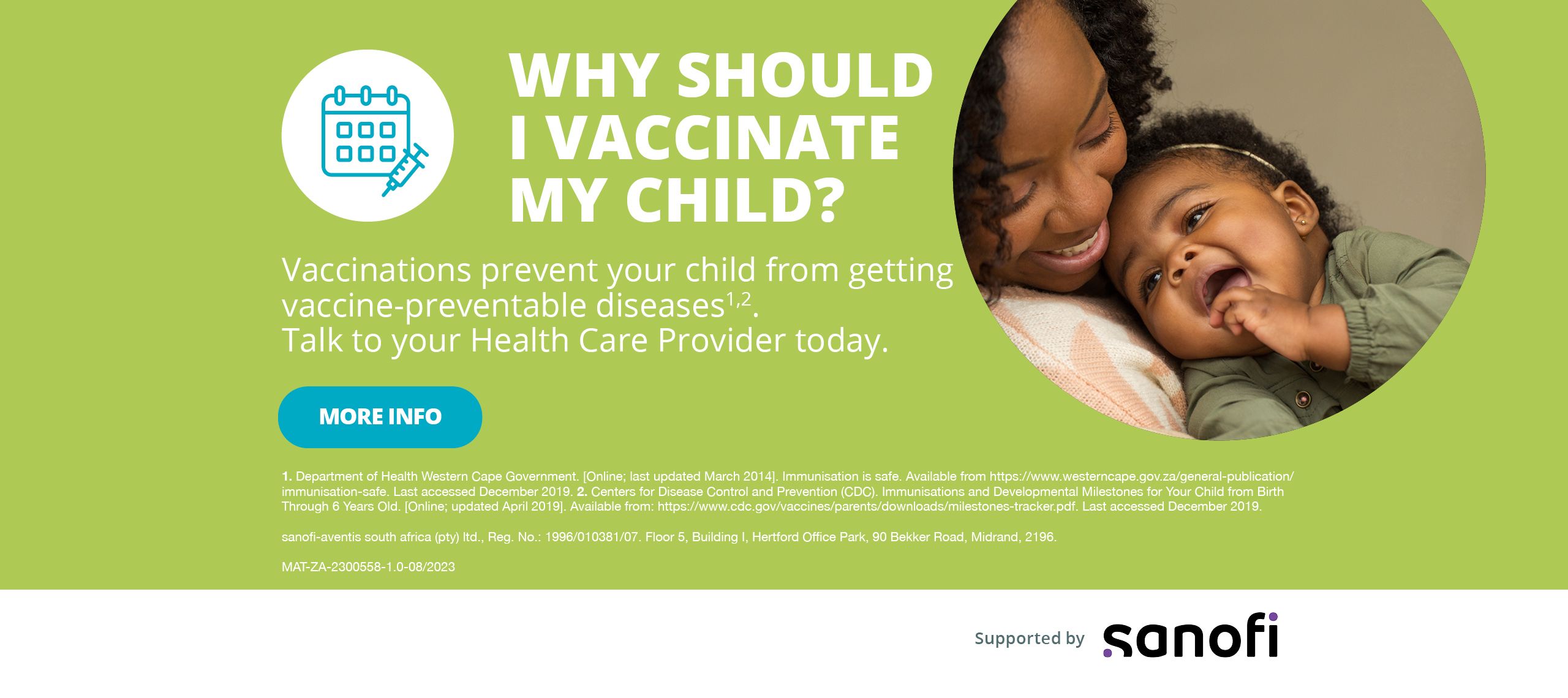Pregnancy & Childhood Vaccinations in South Africa: What you need to know
Did you know that vaccine-preventable diseases are still the most common cause of childhood deaths? According to a study conducted by the World Health Organization (WHO) and United Nations International Children’s Emergency Fund (UNICEF), an estimate of 29% of deaths among children aged 1– 59 months were due to vaccine preventable diseases1.

Did you know that vaccine-preventable diseases are still the most common cause of childhood deaths? According to a study conducted by the World Health Organization (WHO) and United Nations International Children’s Emergency Fund (UNICEF), an estimate of 29% of deaths among children aged 1– 59 months were due to vaccine preventable diseases1.
How do vaccines work?
Vaccines contain small amounts of either a weakened germ or part of a killed germ that causes a particular disease2. When you or your child is given a vaccine, the body’s defences are activated2. The immune system starts making cells and antibodies that recognise specific parts of that germ and is then able to practise fighting the disease2. This response means that if your body is exposed to the actual disease-causing germ, the cells and antibodies are already present to fight the disease2. Your immune system is thus prepared to recognise and fight diseases in advance if you have been vaccinated2.
How does getting vaccinated during your pregnancy help to protect your baby?
Getting vaccinated during your pregnancy is also important3. A pregnant mother’s body creates protective antibodies and some of them pass to her baby before birth3. This immunity (protection) decreases over time; however, the maternal (from the mother) antibodies can provide protection for your baby against some diseases until his or her routine vaccination schedule starts from 6 weeks of age4,5.
What are some of the negative health consequences of not being vaccinated?
The immune system of your newborn baby is not fully developed which makes them vulnerable to infections6. Babies and children who are not vaccinated or partially vaccinated, are at risk of contracting harmful vaccine-preventable diseases such as hepatitis, tuberculosis, whooping cough, and diphtheria7.

The Expanded Programme on Immunisation in South Africa (EPI-SA)
Vaccinating against diseases like measles, rubella, polio, diphtheria, whooping cough (pertussis), tetanus, hepatitis B, Haemophilus influenzae type b (Hib), tuberculosis, pneumococcal disease and diarrhoea caused by rotavirus, is a free public health service available in Public Clinics in South Africa5,8. The main target population for the EPI-SA are pregnant women and children under 13 years old5.
To help protect you and your child, we have provided a brief overview of the vaccinations available from pregnancy to early adolescence, based on the EPI-SA national recommendations for 2024.
Vaccination in Pregnancy:
As an expecting mother, you will be given a dose of the tetanus, diphtheria, and pertussis vaccination during your 2nd to 3rd trimester of your pregnancy (between 26 weeks and 34 weeks)5,9. A baby gets disease immunity (protection) from their mother during pregnancy10. This immunity can protect baby from some diseases during the first few months of life10. Immunity in newborn babies is only temporary and starts to decrease after the first few weeks or months4. As newborn immunity is only temporary, it's important to begin childhood vaccinations when your baby is 6 weeks old4,5.
Infancy to toddler age:
New to the world and at this stage, your child’s immune defences are still learning what it means to live in a world full of strange, new bacteria and germs. Your child needs to be vaccinated from birth against tuberculosis and polio, with a booster for the oral polio vaccine given when they are 6 weeks old5. From 6 weeks, your child needs to be vaccinated to protect them against rotavirus, diphtheria, tetanus, pertussis (whooping cough), hepatitis B, polio, Haemophilus influenzae type b infections, and return for boosters at 10 weeks, 14 weeks, and 18 months5. For protection against pneumonia, the pneumococcal vaccine is given from 6 weeks, with two boosters needed at 14 weeks and 9 months5.
Other vaccinations to keep in mind during the infancy stage include the measles and rubella vaccine and a booster at 6 and 12 months5. Seasonal vaccines like the flu vaccine, come into play from around 6 months of age11.
Childhood to adolescence:
When your child begins their school chapter of life, it introduces a whole new world of cross-contamination possibilities. By school entry age (6 years old) your child will get their first dose of a vaccine that helps protect against diphtheria, tetanus, and acellular pertussis5.
In grade 5 of their school year, girls can receive the human papillomavirus (HPV-2) vaccine, to receive protection against the human papillomavirus, which in some cases can cause cancer5,12.
As your child bids goodbye to his or her early adolescent years by the age of 12, it’s time for follow-up vaccinations for protection against tetanus, diphtheria and whooping cough, following primary immunisation5. For a missed dose of this vaccine, a ‘catch-up or campaign’ dose is offered during grade 5 for both girls and boys5. A booster vaccine for these 3 diseases is recommended every 10 years13.

* This is not a complete list of vaccines required for life-course immunisation.
* The life-course approach to immunization recognizes the role of immunization as a strategy to prevent disease and maximize health over one’s entire life, regardless of an individual’s age. A life-course approach requires that immunization schedules and access to vaccination respond to an individual’s stage in life, their lifestyle, and specific vulnerabilities/risks to infectious disease that they may face15.
*Ask your Health Care Provider for more on life-course vaccination.
Read more how to prevent and protect with Sanofi:
References:
- Galadima AN, Zulkefli NAM et al. Factors influencing childhood immunisation uptake in Africa: a systematic review. BMC Public Health. 2021 Jul 28;21(1):1475.
- World Health Organization (WHO). How do vaccines work. https://www.who.int/news-room/feature-stories/detail/how-do-vaccines-work. Accessed February 2024.
- Munoz FM, Jamieson DJ, et.al. Maternal Immunization. Obstetrics and Gynecology. Vol. 133. No.4. April 2019.
- NHS. How long do babies carry their mother's immunity? https://www.nhs.uk/common-health-questions/childrens-health/how-long-do-babies-carry-their-mothers-immunity/. Accessed February 2024.
- Department of Health (DOH), South Africa. Expanded Programme on Immunisation – EPI (SA) Revised Immunisation Schedule from January 2024.
- British Society for Immunology. Neonatal Immunology. https://www.immunology.org/public-information/bitesized-immunology/immune-development/neonatal-immunology#:~:text=Like%20many%20other%20systems%20in%20the%20body%2C%20the,we%20are%20at%20an%20increased%20risk%20of%20infection. Accessed February 2024.
- UNICEF for every child. 7 consequences and risks of not getting your child routinely vaccinated. https://www.unicef.org/indonesia/health/stories/7-consequences-and-risks-not-getting-your-child-routinely-vaccinated. Accessed February 2024.
- Department of Health (DOH) Western Cape Government. For You. Immunization. https://www.westerncape.gov.za/service/immunisation. Accessed February 2024.
- Centers for Disease Control and Prevention. Vaccinating Pregnant Patients. https://www.cdc.gov/pertussis/pregnant/hcp/pregnant-patients.html. Accessed February 2024.
- Centers for Disease Control and Prevention (CDC). Vaccinations During and After Pregnancy. https://www.cdc.gov/vaccines/pregnancy/vacc-during-after.html. Accessed February 2024.
- National Institute for Communicable Diseases (NICD). Influenza Guidelines. https://www.nicd.ac.za/wp-content/uploads/2023/05/Influenza-guidelines_-25April-2023-final.pdf. Accessed February 2024.
- Mayo Clinic. HPV Infection. Overview. https://www.mayoclinic.org/diseases-conditions/hpv-infection/symptoms-causes/syc-20351596. Accessed February 2024.
- Sibanda M, Meyer JC, et. al. Promoting Healthy Aging in South Africa through Vaccination of the Elderly. Frontiers in Public Health. Volume 9. Article 635266. April 2021.
- IFPMA. Implementing a Life-Course Approach to Immunization. https://www.ifpma.org/publications/implementing-a-life-course-approach-to-immunization/. Accessed February 2024.
sanofi-aventis south africa (pty) ltd., Reg. No.: 1996/010381/07, Floor 5, Building I, Hertford Office Park, 90 Bekker Road, Midrand, 2196.
MAT-ZA-2301099-1.0 03/2024


